Although some have made light of it, Lance Armstrong’s latest run-in with French anti-doping authorities is no joke.
At worse, the French say, they have the power to suspend the seven-time Tour de France champion from competing in the country for supposedly having kept a drug tester waiting. That would certainly take the shine off Armstrong’s comeback that has pulled in publicity and crowds for his battered sport.
Even if it doesn’t come to sanctions, the French anti-doping agency’s suggestion that Armstrong didn’t cooperate fully with their tester could again mean that he’ll compete at this year’s Tour under a cloud. Unless, of course, the claims cause him to simply throw up his hands and say: “You know what? Forget your Tour. I don’t need this.”
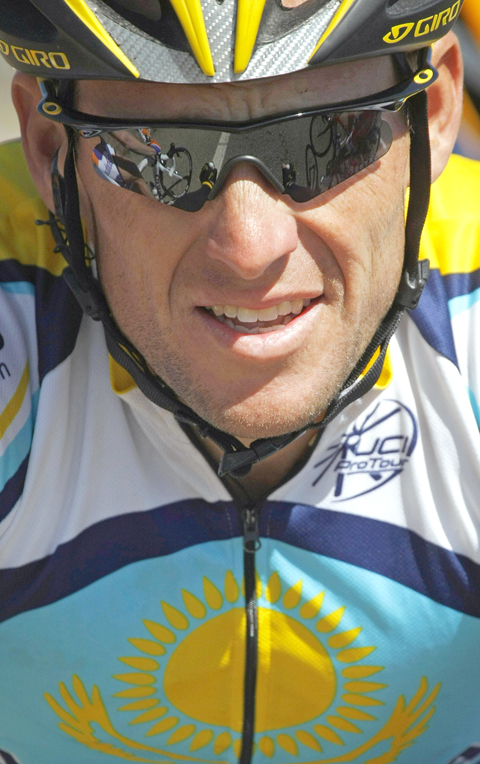
PHOTO: AP
He’s dropped that hint before.
Seems we’re right back where we were in 2005, when he quit the sport — temporarily as it turned out — railing against the “cynics and the skeptics” who simply don’t buy the tale of the cyclist who survived cancer to win the world’s toughest bike race a record seven years in a row — without, he insists, using illegal drugs.
Armstrong’s push this year for an eighth Tour title was meant to be the highlight of his return after a three-year hiatus.
But instead, if the contentious drug-test affair is still unresolved by then, he could spend time in July having to answer yet more doping questions. It is not the good publicity he hoped for when he climbed back into the saddle to spread the word about fighting cancer and to see whether, at age 37, he’s still a winner.
The prospect for fans of cycling and of Armstrong — often two diametrically opposed groups of people — is confusion.
There is such bad blood between Armstrong and the French agency and such wide differences in their accounts of what happened on March 17, when the agency dispatched its most trusted tester to knock on the rider’s door, that we may never feel that we have gotten the whole truth.
Again, it could come down to who you believe — Armstrong or skeptical French officials who doubt his exploits and have suggested but never proved that he cheated in the past.
This time, both sides can be faulted.
Keeping a tester waiting is a big deal, invariably raising suspicions that an athlete might be hiding something, maybe that he needed a few minutes in the toilet to mask traces of doping.
Armstrong’s been in cycling since he was a teenager. He claims to be one of the most tested athletes on the planet and he has long suspected that some in France have it in for him. So one might think that he’d have been extra, extra careful not to put even a toe wrong when he went to the south of France in March to train.
With hindsight, the smart thing to have said when the tester appeared, asking for urine, blood and hair samples, might have been: “Come right in. I’ll roll up my sleeve for the needle right now.”
Instead, Armstrong says the testing was delayed for 20 minutes while his team manager, Johan Bruyneel, checked that the tester was bona fide and not “just some French guy with a backpack and some equipment.”
Armstrong says the tester let him go inside and shower while Bruyneel made his calls.
Armstrong says one reason he questioned the man’s authority was “I was unaware that in France the government tests athletes and takes the position it can test any athlete residing in or visiting France.”
Ignorance is not a solid defense.
For its part, the agency can be questioned about the glee with which it announced that it had cornered Armstrong for the unannounced test. This wasn’t merely about seeing whether Armstrong is clean, it was a message: In France, you’re on our turf and you’ll get no special treatment.
“He needs to know that he is like everyone else,” said the agency’s president Pierre Bordry, which sounds distinctly as if Armstrong was specifically targeted and therefore is not simply like everyone else.
At the agency, the version of events is that only when the tester threatened to call in gendarmes did Bruyneel agree to let testing proceed and the French official pooh-poohed Armstrong’s claim that the tester let him shower. The tester reported that he repeatedly warned Armstrong that he had to keep him within his sight at all times.
The agency says it hasn’t decided whether to launch disciplinary proceedings. But Bordry seemed to hint that it might, saying he didn’t want to comment because “we are entering into a contentious phase, or likely to be contentious.”
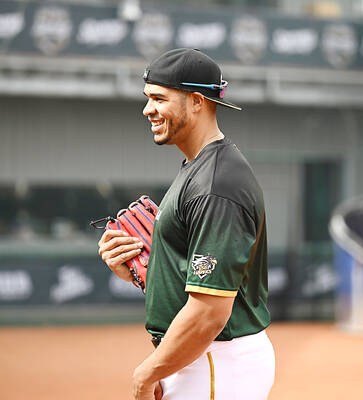
Tainan TSG Hawks slugger Steven Moya, who is leading the CPBL in home runs, has withdrawn from this weekend’s All-Star Game after the unexpected death of his wife. Moya’s wife began feeling severely unwell aboard a plane that landed at Taiwan Taoyuan International Airport on Friday evening. She was rushed to a hospital, but passed away, the Hawks said in a statement yesterday. The franchise is assisting Moya with funeral arrangements and hopes fans who were looking forward to seeing him at the All-Star Game can understand his decision to withdraw. According to Landseed Medical Clinic, whose staff attempted to save Moya’s wife,
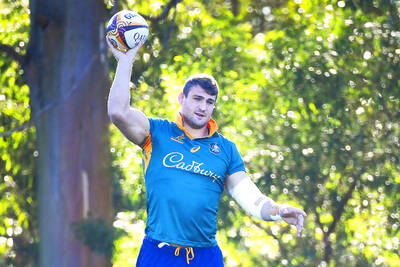
Wallabies coach Joe Schmidt yesterday backed Nick Champion de Crespigny to be the team’s “roving scavenger” after handing him a shock debut in the opening Test against the British and Irish Lions Test in Brisbane. Hard man Champion de Crespigny, who spent three seasons at French side Castres before moving to the Western Force this year, is to get his chance tomorrow with first-choice blindside flanker Rob Valetini not fully fit. His elevation is an eye-opener, preferred to Tom Hooper, but Schmidt said he had no doubt about his abilities. “I keep an eye on the Top 14 having coached there many years
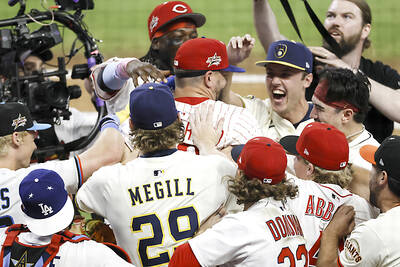
ON A KNEE: In the MLB’s equivalent of soccer’s penalty-kicks shoot-out, the game was decided by three batters from each side taking three swings each off coaches Kyle Schwarber was nervous. He had played in Game 7 of the MLB World Series and homered for the US in the World Baseball Classic (WBC), but he had never walked up to the plate in an All-Star Game swing-off. No one had. “That’s kind of like the baseball version of a shoot-out,” Schwarber said after homering on all three of his swings, going down to his left knee on the final one, to overcome a two-homer deficit. That held up when Jonathan Aranda fell short on the American League’s final three swings, giving the National League a 4-3 swing-off win after
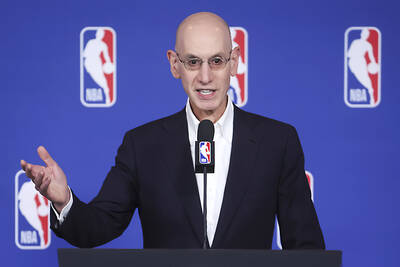
NBA team owners on Tuesday authorized league officials to begin an in-depth analysis regarding expansion, but NBA commissioner Adam Silver said there was no timetable for any changes. The NBA board of governors meeting in Las Vegas marked the first time team owners officially discussed expanding the league beyond 30 teams, but Silver said they went no deeper than requesting more research into the possibility. “There is a significant step now in that we’re now engaging in this in-depth analysis,” Silver said. “It’s something we weren’t prepared to do before, but beyond that, it’s really day one of that analysis. In terms